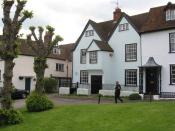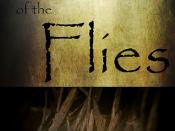In "Lord of the Flies" by William Golding, the two main characters, Ralph and Jack, represent weaknesses of succumbing to darkness in order to emphasize man's inevitable fall into savagery. Golding demonstrates how man's innate savage nature unavoidably dominates all forms of civility and society, by exemplifying the faults of man in a concentrated setting such as the island. The novel is considered a fable or a parable because it includes an antagonist, a protagonist and a moral lesson.
The protagonist, Ralph, who personifies order, pragmatism, and everyman's natural weakness, displays power and influence in the beginning but is almost tempted into savagery in the end, yet Golding's purpose is to present hope and optimism for human nature. Ralph and Piggy discover the conch shell on the beach at the start of the novel and use it to summon the boys together after the crash separates them. The conch shell represents a powerful symbol of order and civilization in the novel, but although its purpose of preserving order is effective in the beginning, its power subsides as quickly as Ralph's.
His use of the conch in the beginning demonstrates his sensible characteristics and his civilized nature. In addition to rationality, Ralph's practicality is illustrated by his constant obsession with the state of the fire, as Piggy can "tell you what Ralph's going to say next: the most important thing on the island is the smoke and you can't have no smoke without a fire" (Golding 158). As part of his rational nature, Ralph always reminds the boys about the fire for the sake of their rescue. Although the fire is a symbol for hope and civilization, it ironically demonstrates the regression of the boys' civility in society. He is primarily presented as a positive entity, but he also possesses an...


